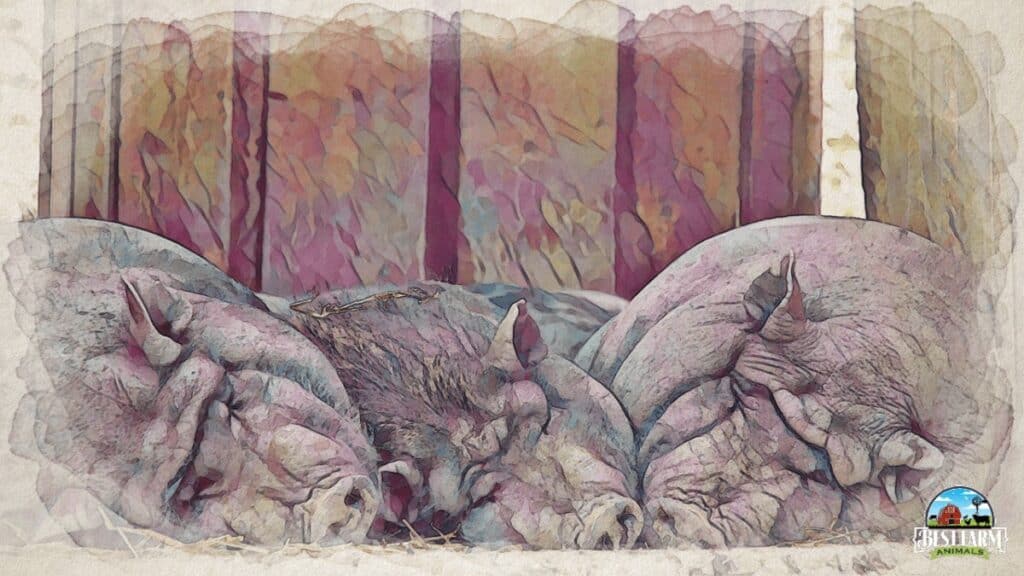Roundworm Infection (Ascariasis – Ascaris Suum) Zoonotic
Ascariasis (Roundworm infection) is a parasitic disease that occurs when a pig is infected with roundworm (Ascaris suum). This can cause hepatitis and pneumonia. A mature roundworm (ascarid) with a round body is about 0.78 inches long and can lay up to 2 million eggs daily.
An adult roundworm can survive in a pig’s body for almost six months, and some survive longer than a year. A single pig can have an infestation of hundreds of roundworms in their intestines. It can become so serious that your pig falls severely ill.
Roundworm parasites can spread to humans by accidentally ingesting soil or sand contaminated by infected animal feces (not washing hands and touching your mouth). Regular deworming of your pigs is advised so that people aren’t infected..
Causes of Ascariasis
Roundworm infection in pigs is caused by ingesting Ascarid eggs. Infected pigs, dust, pig manure, and insects transport the eggs. The most common infestation cause is contaminated feces in the pigs living area.
Eggs hatch in the pig’s intestine once ingested. The larvae pass through the bloodstream to the liver and other sites. Once the larva arrives in the lungs (approximately 10 days later), they are coughed up and re-swallowed.
The worms then lay further eggs in the intestine, and the cycle continues, and eventually, the pig has a roundworm infestation. The spread to other pigs occurs when farmers unknowingly place the herd in an infected area on the farm.
Symptoms of Ascariasis
Ascariasis infestations cause the following symptoms in pigs:
- The pig’s hair is rough
- Battles to put on weight
- Coughing
- Lack of energy
- The abdomen seems to be hanging
- Appears hungry
- Pneumonia
- Severe infestations can result in death
- Difficulty breathing
Treating Ascariasis
Medications such as Ivermectin (Ivomec) and Benzimidazoles can be administered to pigs through an injection to the neck. This medication paralyzes and kills the parasites. Add Hygromycin to the pigs’ feed.
Regularly deworming your herd is vital to prevent infestation and the spread of the parasites. Unfortunately, the eggs are resistant to disinfectants, and the most successful way to destroy them is by steam cleaning or prolonged exposure to full sunlight.
References
Iowa State University College of Veterinary Medicine Roundworm Infection (Ascariasis)
My Most Used Pig Supplies
This list contains affiliate products. Affiliate products do not cost more but helps to support BestFarmAnimals and our goal to provide farm animal owners with accurate and helpful information.
Purina Pig Chow will last well (or Mazuri is popular, but I haven’t tried it), and the stainless steel non-skid bowls that will help keep the mess down.
A pig blanket to keep her warm. This one also has bright colors and helps to provide rooting without the destruction.
Pig Harness for walking and handling your pig. There are a lot to choose from, but this one is pretty easy to use. If you want one that has a separate leash, this looks like a good one.
A large crate for keeping her safe in your house at night and when you leave the house. This is essential. You’ll also want a litterbox, and I like mine with a lid for nighttime. Pine shavings are best, and you may be able to find them in larger quantities locally.
When you have accidents, Odoban will help eliminate odors. When you are potty training, these floor pads work great for keeping your house clean while training her to go in certain places.
You’ll also want an outdoor house to keep her warm when she gets outside time, an essential part of her development.
Dewormer- Ivermectin is the primary dewormer I use, although I do rotate with a non-ivermect ingredient once so that the worms don’t get immune to it.

